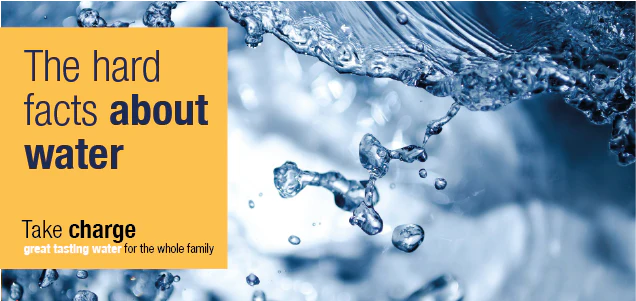Whilst most people will have heard of the terms hard and soft water, not everyone is quite sure what they actually mean. And most people won't know what difference it makes whether they have one or the other coming into their home. Here, we'll have a quick look at what hard water is and what you can do about it should you live in an area supplied with hard water.
What is hard water?
In simple terms, hard water is water that has a high mineral content when compared to soft water. When water falls as rain, it's free from any minerals and so we call this soft water. It then picks up minerals, dissolves them and holds them in solution as it passes through rock, limestone, chalk, sand and soil. Hard water is generally high in mineral salts, especially calcium and magnesium carbonates. The degree of hardness becomes greater as the calcium and magnesium content increases.
Due to various rock structures and landscapes, water in different parts of the UK varies in the amount of dissolved minerals it contains, and it's this that determines whether it is hard or soft in nature.
There are advantages and disadvantages to both types, but hard water in particular has the natural ability to cause a few problems, which can be a nuisance in the home and workplace. It can even cause damage to vital components.
Hard water is not a health risk, in fact it's often considered to be good for health due to its calcium content.
What's the problem?
Water is a rather good solvent (a solvent is any substance that can dissolve another substance) and so it's able to pick up impurities very easily and hang on to them.
The problem is that the very water we all need for drinking and cooking carries within it a number of mineral passengers that have been picked up on its journey through various rocks and sediments on its way to the water treatment works. It's these that get left behind and deposited in numerous places in our homes, especially around our taps and in our kettles. The deposits slowly build up, leaving a film or scaly residues and layers, and forming what we know as limescale.
Hard water facts
- Hard water minerals can clog pipes and reduce water flow to taps
- Deposits of scale are unsightly on drinking water taps and outlets and can be difficult to remove
- Glasses used for drinking water can become white-filmed with mineral residue
- Hard water can affect the taste of tea, coffee and other drinks
What's the answer?
It depends on the scale of the problem (ooops, sorry!) and the amount of mineral deposits that are building up.
If taps constantly appear crusty around the outlet, kettles get frequently "furred up", or a film can be seen on the surface of tea and coffee, then a water filter could be just what's required.
A water filter removes unwanted contaminants immediately before the point of use. The outcome is a reduction in the build up of scale and mineral residue, resulting in taps and kettles remaining in a pristine condition for longer. A filter will also provide wonderfully clear, great-tasting water!
If hard water is giving you a headache, find out more about how a water filter can help by clicking here to contact us.






